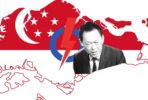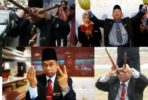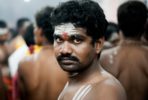By Howard Lee
The silence that overcame the crowd gathered outside Deyi Secondary School in the wee hours of 8 May 2011 consumed the night. Only the voice from the radio of a car parked outside, announcing election results, continued to drone on.
Then someone let out an exasperated sigh. A stifled sob. Curses muttered in anger. The Singapore People’s Party had lost both Potong Pasir SMC and Bishan-Toa Payoh GRC.
Only a few hours back, this crowd had gathered outside the counting station to support Mr Chiam See Tong, secretary-general of the SPP, in his bid for Bishan-Toa Payoh GRC, jubilantly talking about his campaign and his chances. They were full of hope that his team would win the GRC.
When the gates to the school-turned-counting centre finally opened, Chiam was standing with his team to thank the supporters. Unable to contain their emotions, the group surged forward, paying no heed to the police officers manning the gates, nor the reporters caught in the front.
All they wanted to do was reach out to Chiam, affirm their support, shake his hand – do anything to make him feel like a champion. Chiam did not win the election, but he won their hearts.
Any sane observer present would have immediately realised that this group did not just invest emotionally in his campaign. They were his extended family. They have invested emotionally in Chiam the man. No other Singaporean politician living today would be able to make such a claim.
And any sane observer would ask two questions: Who is this man, and why does he have such an impact on people?
* * * * *
SPP team Bishan Toa Payoh GE2011
The SPP team for Bishan-Toa Payoh GRC, GE2011.
“Let The People Have Him – Chiam See Tong: The Early Years”, written by Loke Hoe Yeong – associate fellow at the European Union Centre and assistant secretary-general of the SPP – provides an invigorating insight into the character of the man who has become the epitome of gentlemanly politics in Singapore.
Loke traces Chiam’s early history – from his birth to his political awakening, his landmark Potong Pasir win in GE1984 and his first speech in Parliament – giving readers a much needed peek at what drives Chiam as a person and politician.
“It was actually a rather innocuous idea that I had after GE2011,” shared Loke. “I wanted to read more about the opposition and opposition leaders, but there was no biography on Chiam. So I decided, why not do it myself? It was a labour of love, piqued by my interest as a researcher, to find balance in the narrative of our political history.”
Suport for Chiam Deyi Sec GE2011Mild-mannered for a reason
Indeed, the popular narrative that surrounds Chiam has been less than favourable. He lacks oomph as a Parliamentarian and public figure, preferring to take a non-confrontational approach. He was careful and mild for fear of antagonising the ruling People’s Action Party. He is an easy target for the ruling party. He is token opposition.
However, Loke’s simple and straight-forward account of Chiam’s childhood, youth and bumbling foray into the lion’s den as a novice politician takes us out of the one-dimensional portrayal of Chiam, and presented a warm and at times humorous account of Chiam as a person.
We learn from Chiam’s colourful childhood, from his aversion to studies to his easy-going nature and helpful personality, that his mild-mannered approach to life has always been a part of him. Loke described the instance when he won a catapult in a tree-climbing dare, but thought nothing of lending it to a friend immediately afterwards. When his friend returned it broken the next day, Chiam registered disappointment, but not anger.
There is little wonder when Loke revealed that Chiam’s unprecedented win in the defamation lawsuit against S Danbalan, and the subsequent public apologies he received from him and Howe Yoon Chong, was not even something that Chiam thought was necessary.
Politics for democracy, policies for the people
Cover of “Let The People Have Him”, Epigram Books
Cover of “Let The People Have Him”, Epigram Books
In many ways, Chiam’s affable personality was the only constant in the constantly changing social and political environment of the 70s to 80s. Loke gave a historical account of the various policy issues that led to growing resentment against the ruling People’s Action Party, which were instrumental to Chiam winning the hearts of the people.
Loke believes that Chiam’s story is also one about political and policy discourse in Singapore, and how a political newbie has brought an important change to how people looked at politics and policies.
“If you look at the policy discourse leading up to the 1984 elections, there was a lot of talk about the CPF (Central Provident Fund), housing,” said Loke. “We see people reacting to the government’s policies in a way that indicated there was a rupture in the social compact. Some people call it looking at bread and butter issues, and the need for democracy was fairly abstract for people to grasp.”
Loke recognised that Chiam struggled with getting his ideas across in his early political life. “To the ordinary people, Chiam came across as a fine chap, but they can’t see how his ideas and ideals can affect their lives.”
But as Chiam matured as a politician and developed the Singapore Democratic Party, he was better able to strengthen the link between policy and politics. “People began to realise that the social compact was broken, and they can no longer leave it to the (PAP) politicians to run the country alone.”
“In that sense, I believe that Chiam reinvented opposition politics in Singapore. I have the greatest respect for Barisan Sosialis and JB Jeyaretnam, but the policy manifesto of Barisan then was a little outdate, and the people then didn’t think it was realistic. They also preferred a less confrontational approach than what we had in the 50s and 60s.”
“It was a different set of problems they faced, worrying about livelihood and rapid progress. Chiam basically reinvented the image of the opposition as people who are viable to be elected. What helped greatly was his ability to draw reference to real policy issues, and made people realise that the opposition’s voice in Parliament was necessary.”
More to be said
An adventurous Chaim with Lina and “Herbie”, road trip from London to Singapore.
An adventurous Chiam with Lina and “Herbie”, on their road trip from London to Singapore. (Image from the Chiam family)
Despite a timeline that spans decades, “Let The People Have Him” is a joyous trip of exuberance documenting Chiam’s early life, in a narrative that is extremely easy to follow.
“This is a human story of a man who did something rather brave for his time, given the fear that hung over the many political arrests at that time,” said Loke. “I wanted to offer an idea of what drove him to go into politics, especially since it was such a high risk thing to do. His life story, family background, education background, his exposure to politics, following his father’s wishes, how he eventually found his passion – all this coloured what he sees as problems in Singapore’s history.”
“I hope to contribute to the literature of biographies of Singapore’s politicians, pioneers who have made a difference to Singapore in different ways. I want readers to know the different facets of what happened in the past, so that they can make up their own minds (about Singapore’s history).”
Was he concerned about his political affiliations with Chiam? Loke said that the idea of the book preceded his SPP membership, and it was actually in the course of writing the book that he learned more about the Chiams, understood and liked the SPP’s mission, and started to volunteer with the party. “I think readers can see for themselves that there is no real bias, that the book is basically a historical account of Chiam’s life.”
There is, of course, more to come. Loke is working on his second volume, which will document Chiam’s subsequent life as a Parliamentarian and highlight some of his key speeches made.
Nevertheless, “Let The People Have Him” offers an important, if not comprehensive, look into what motivates and forms the political mind of one of Singapore’s most recognisable political icons, but the personal approach of the book would make you believe that he is just an ordinary man.
Ironically, it was this ordinary man who against the odds of his time, won over the people of a little constituency called Potong Pasir, and forever stole the heart of our nation.
“Let The People Have Him – Chiam See Tong: The Early Years” is available for sale at major book stores starting today. It is also available for purchase online at Epigram Books.
Source: www.theonlinecitizen.com/2014/10/chiam-see-tong-understanding-the-man-behind-the-politics







